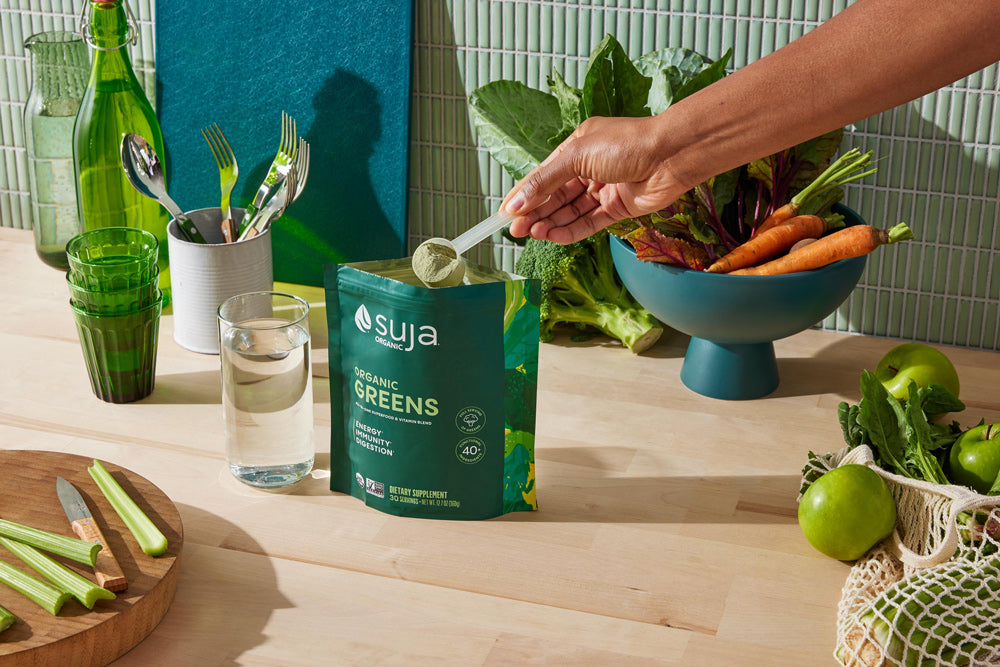In today’s fast-paced world, juggling endless to-do lists and daily demands can make it feel nearly impossible to hit the recommended intake of fruits and vegetables. According to the CDC, adults should consume 1.5–2 cup-equivalents of fruits and 2–3 cup-equivalents of vegetables daily.1 But let's be real—that can seem downright daunting and slightly unrealistic.
Enter green powders - the convenient solution stealing the spotlight. Many brands claim to offer a simple way to boost your intake of vegetables, fruits, and extra goodies like superfoods, probiotics, prebiotics, and vitamins—all in one serving. Easy peasy! But not all greens powders are created equal, and knowing the differences can help you make a better choice for your lifestyle.
Today, we’re diving into a head-to-head comparison between two popular options: Athletic Greens (AG1) and Suja Organic Greens Powder. We'll break down everything from ingredients and cost to taste in this detailed Athletic Greens vs. Suja Organic showdown. Keep reading to find out which one might be your perfect match!
| Suja Organic | Athletic Greens (AG1) | |
|---|---|---|
| USDA Organic | ✔ | |
| Wide Variety of Superfoods | ✔ | ✔ |
| Probiotics | ✔ | ✔ |
| Excellent Source of vitamins A, B, C, D & E | ✔ | |
| Locally-Sourced ingredients | ✔ | |
| Manufactured in the US | ✔ | |
| Less than $1.50 a day (on subscription) | ✔ | |
| Free of Stevia | ✔ |
What is Athletic Greens (AG1)?
Chances are, if you’re on social media, you’ve come across AG1, "a daily foundational nutrition supplement that supports whole body health."2 AG1 claims to be your nutritional insurance by replacing your daily vitamin with over 75 ingredients, including vitamins, minerals, antioxidants, and probiotics. In turn, this formula may support gut health, bolster energy and focus, balance stress, and guard immunity.
Since AG1 is NSF Certified for Sport®, it appeals to professional athletes, trainers, and coaches. American Triathlete Timothy O’Donnell, Formula 1 driver Lewis Hamilton, and Former Olympic gymnast Shawn Johnson have openly endorsed the brand, enhancing its social media allure. Even though AG1 is a robust greens powder, it comes with a pretty expensive price tag, which doesn’t make it accessible to everyone who desires to lead a healthier lifestyle.
| Pros | Cons |
|---|---|
|
|
What is Suja Organic?
Suja Organic Greens Powder is an all-in-one blend that’s carefully formulated for optimal nutritional benefits. It’s specifically designed to help you cultivate and maintain healthy, long-term habits with a full serving of vegetables within seconds. With just one scoop, you immediately get 15+ essential vitamins, minerals, probiotics, adaptogens, and 40+ ingredients you recognize, without artificial ingredients or fillers. This ‘straight-from-nature’ greens powder can support energy, immunity, digestion, and detoxification.
Alongside these benefits, Suja Organic Greens Powder is one of the most affordable and accessible formulas on the market. Plus unlike other formulas, it's 100% USDA Organic, non-GMO, vegan, plant-based, gluten-free, dairy-free, and stevia-free.
| Pros | Cons |
|---|---|
|
|
AG1 Ingredients: What You Need to Know
AG1 boasts a lineup of 75 ingredients, organized into four proprietary blends. This spans prebiotics, probiotics, digestive enzymes, superfoods, stress adaptogens, and more. The ingredient panel features a selection of essential vitamins and minerals, though it notably lacks vitamin D and iron—nutrients that are commonly deficient in many Americans' diets.3
AG1 includes a phytonutrient blend enriched with ingredients like spirulina and chlorella. Its immune support primarily derives from vitamin C and a functional mushroom blend containing astragalus root powder extract and reishi mushroom powder, among others. Additionally, AG1 is sweetened with stevia, providing added sweetness.
While AG1’s extensive ingredient list is impressive, the actual benefits might be limited by the small quantities of each component.

Suja Organic Ingredients: What You Need to Know
When you examine Suja Organic Greens' ingredients panel, you'll see that vegetables make up a significant portion, which is very intentional. Among these star superfoods are kale, providing vitamin A and folate, spirulina, which is anti-inflammatory, and moringa, which is packed with antioxidants. You'll also discover a potent mushroom blend featuring turkey tail, reishi extract, maitake, shiitake, and Chaga, all known for their stress-reducing properties.
As mentioned earlier, Suja Organic Greens is a rich source of essential vitamins A, B, C, D, and E, which many greens powders lack. Additionally, it includes 1 billion CFUs of probiotics and is free from stevia and added sugar.

AG1 Cost
We mentioned already that AG1 is one of the most expensive green powders available, coming in at a cost per serving of $2.63 for a single subscription. Here’s an exact breakdown of its offerings:
- One-time purchase: $99 for 30 servings ($3.30 per serving) or $109 for 30 travel packs ($3.63 per serving)
- Single subscription: $79 for 30 servings ($2.63 per serving) or $89 for 30 travel packs ($2.97 per serving)
- Double subscription: $149 for 60 servings ($2.48 per serving) or $169 for 60 travel packs ($2.82 per serving)
For deliveries to the United States, Canada, and Australia, shipping costs $9. European shipping rates vary.
Suja Organic Cost
Considered to be one of the most affordable greens powders on the market, here’s an exact breakdown of costs for Suja Organic Greens Powder:
- One-time purchase: $59.99 for 30 servings ($1.99 per serving)
- Single Subscription: $30.00 for 30 servings ($1.00 per serving * 1-month subscription sale price)
Suja Organic offers free shipping through FedEx for residents of the following states: California, Arizona, Nevada, Utah, and Oregon. For residents outside the free shipping states listed above, a shipping fee of $9.99 applies to all orders. All subscriptions come with free shipping regardless of your location.
AG1 vs. Suja Organic: Taste and Texture Review
Of course, taste is purely subjective since not all taste buds share the same preferences. When it comes to AG1, the flavor is slightly tropical, with notes of pineapple and/or bubblegum, which is likely due to the stevia. However, many AG1 users say that the texture is gritty and sand-like, making it harder to dissolve.
Suja Organic Greens Powder doesn’t contain added sugar or artificial flavors, so the taste is extremely natural and chameleon-like: meaning you just blend it into your preferred liquid and reap the health benefits. The texture is silky-smooth and particularly easy to blend.
“I was expecting an overly earthy “green” taste, which had put me off other juices previously, however, the flavor was very subtle and light, it was very refreshing and I’d be happy to drink it with nothing else added to the water. I was also pleasantly surprised with how well the powder mixed into the water and didn’t leave any clumps/bits that you couldn’t mix in.” - User, Katie S.
Is Suja Organic Greens Powder Right for You?
So there you have it: a side-by-side comparison of AG1 and Suja Greens Powder! To recap, AG1 is a good option for performance-seekers who aren’t fazed by an expensive price tag. On the other hand, Suja Organic Greens Powder isn’t just for athletes - it’s for everyone seeking a more balanced, healthy lifestyle with simple, clean ingredients you can trust.
Plus, when you choose monthly deliveries, the cost per serving is about 83% more affordable than AG1, making it easy to take that first step toward your long-term wellness goals.
Although it ultimately comes down to your preferences and lifestyle, we invite you to join the Suja family and take charge of your health routine with Suja Organic Greens Powder!
Endnotes
- Lee, S. H. (2022). Adults Meeting Fruit and Vegetable Intake Recommendations — United States, 2019. MMWR. Morbidity and Mortality Weekly Report, 71(1). https://doi.org/10.15585/mmwr.mm7101a1
- AG1 by Athletic Greens®. (n.d.). Drinkag1.com. https://drinkag1.com/
- Adda Bjarnadottir. (2019, May 21). 7 Nutrient Deficiencies That Are Incredibly Common. Healthline; Healthline Media. https://www.healthline.com/nutrition/7-common-nutrient-deficiencies
Disclaimer: This blog contains promotional content about our products. The information provided in this blog is for educational and informational purposes only and should not be construed as medical advice. While the nutritional information and health tips shared here are based on published studies and expert insights, they should not replace advice and treatment from a healthcare professional. Always consult a qualified healthcare provider with any questions you may have regarding a medical condition or health objectives.














